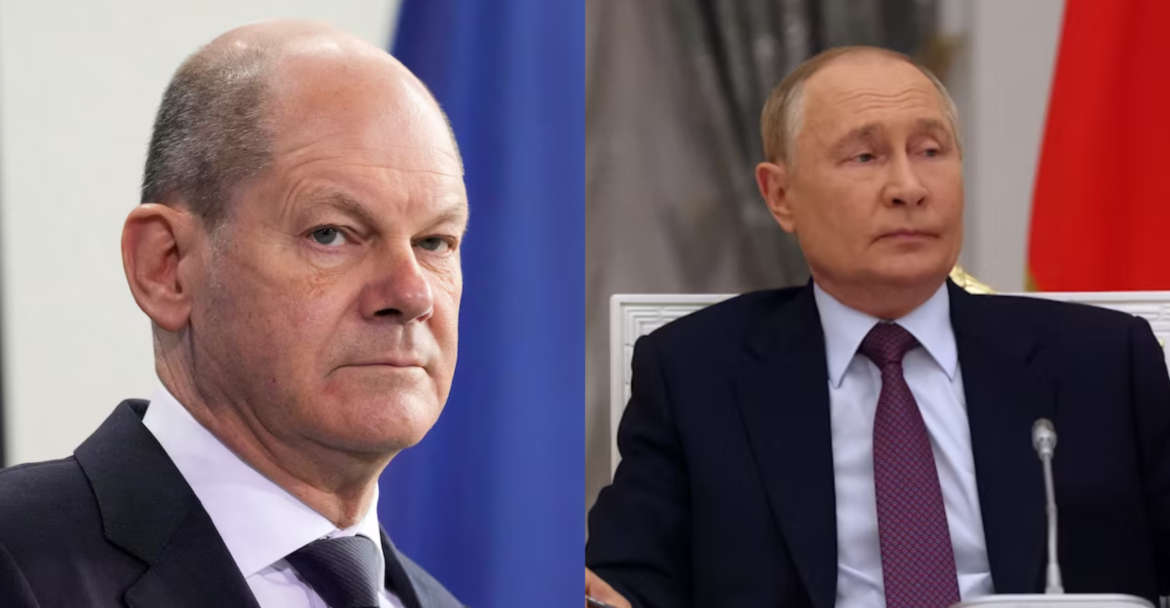In their first phone conversation in nearly two years, German Chancellor Olaf Scholz urged Russian President Vladimir Putin to withdraw troops from Ukraine and engage in talks to achieve a “just and lasting peace.” The call, initiated by Berlin, drew criticism from Ukrainian President Volodymyr Zelenskiy, who warned it could undermine efforts to isolate Russia.
Scholz Stresses Peace and Continued Support for Ukraine
Scholz emphasized Germany’s unwavering support for Ukraine, pledging continued military and financial assistance. A government spokesperson stated that the chancellor “called on Russia to demonstrate a willingness to negotiate with Ukraine for a peaceful resolution.”
However, Zelenskiy dismissed the value of conversations with Putin, arguing they help Russia weaken international isolation. “This is exactly what Putin has been seeking—normalizing talks that lead nowhere,” he said during his nightly address.
Kremlin’s Perspective
The Kremlin framed the conversation as “extremely positive” and highlighted Putin’s insistence that any peace agreement must address Russia’s security concerns and recognize “new territorial realities,” referring to territories occupied by Russian forces.
The call coincided with escalating hostilities in Ukraine’s east, where Russian troops have made advances amid reported shortages of Ukrainian arms and personnel.
Domestic Pressure and European Concerns
The call comes as Scholz faces a snap election in February, with his Social Democrats under pressure from populist parties advocating for greater diplomatic engagement with Russia. Some European officials speculated that the move was aimed at addressing domestic concerns rather than influencing the war’s outcome.
One Western diplomat remarked, “Scholz might now tell voters that he tried diplomacy, but Putin isn’t open to meaningful discussions.”
Trump’s Victory Raises Uncertainty
The timing of the call follows Donald Trump’s election as U.S. president, sparking fears about potential shifts in Western support for Ukraine. Trump has criticized the scale of military aid for Kyiv and suggested he could quickly end the war, though he has not outlined how.
European allies, including French President Emmanuel Macron, have refrained from similar direct talks with Putin.
Ongoing Developments and Challenges
Scholz plans to brief Ukrainian President Zelenskiy, EU leaders, and NATO officials on the call’s outcome. German officials reported that Putin expressed interest in resuming energy discussions with Germany, despite the cessation of Russian gas deliveries after the 2022 Nord Stream pipeline explosions.
Germany remains one of Ukraine’s largest supporters, contributing €15 billion in financial, humanitarian, and military aid since the conflict began. Yet the uncertainty surrounding U.S. aid under Trump’s administration adds to concerns about Ukraine’s ability to sustain its defenses.
Escalation Warnings
During the call, Scholz reportedly condemned the deployment of North Korean troops to support Russia in Ukraine. Zelenskiy alleged that 11,000 North Korean soldiers are fighting in Russian territories, with some already suffering casualties in clashes with Ukrainian forces.
Stay connected to know more on arcnews.online for global news like German Chancellor Olaf Scholz Discusses Ukraine War with Vladimir Putin. For videos updates visit our YouTube. Do subscribe to Arcnews to get latest updates directly in your mail box.
Have A Great Day.


